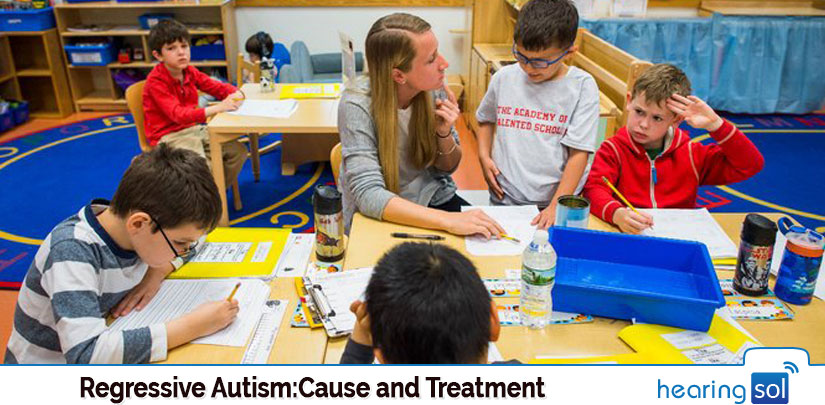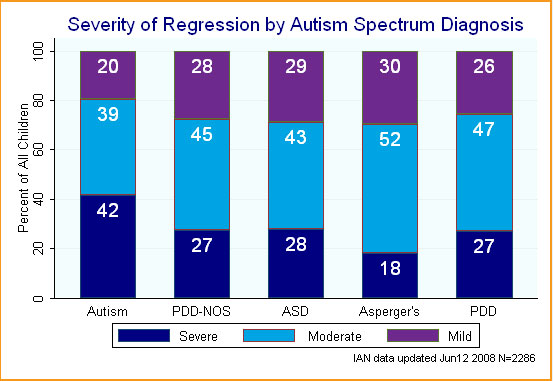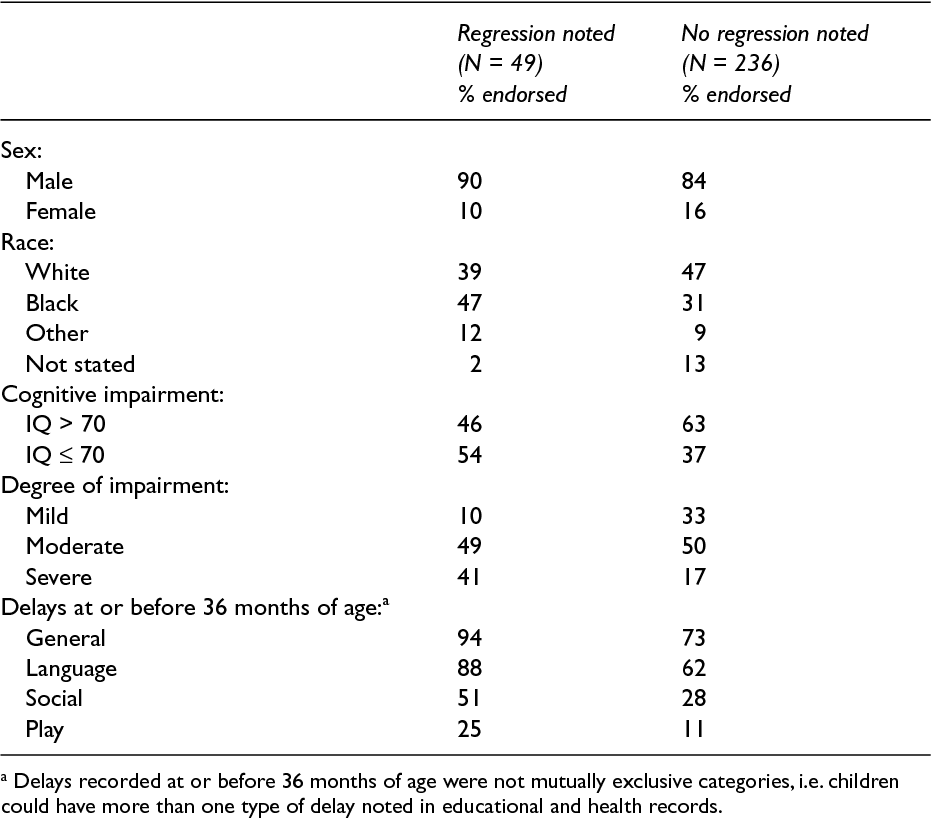
A number of studies propose that a subset of children with autism make significant social and language gains during the first year of life, and then experience a dramatic loss of skills.
As infants, these children babble and make eye contact. However, these abilities suddenly disappear. Your child stopped talking. This loss of skills is known as regression.
If you need any assistance or have a question about Regressive Autism, you can consult our HearingSol experts with your problem, feel free to call us on +91-9327901950. We are always here to help you.
A child with Autism may suddenly become quiet and uninterested and start avoiding people. He loses his acquired language skills and his behavior becomes uncommon. These are the signs of regressive autism.
There is a lot of contradiction on the possible cause of regressive autism. Most of them believe it occurs due to genetic and chromosomal abnormalities.
Yes, it is also caused by the genetic problem but this alone is not the cause. Autism and Regressive Autism both are connected to each other, you have to understand autism, before knowing what is regressive autism.
Important Information About Autism
Autism is a lifelong developmental disability also known as Autism Spectrum Disorder (ASD) that causes issues with communication, social, verbal, and motor skills.
The most important fact about autism as it is a spectrum disorder, means its effects vary from person to person.
In a single line, It is a developmental disorder that damages the ability of communication and interaction.
People suffering from autism may exhibit symptoms such as self-harm, poor eye contact, impulsivity, poor eye contact, a problem with paying attention, learning disability.
Regressive Autism is also a type of ASD disorder.
Understanding The Basics of Regressive Autism
On the basis of the US Centers for Disease Control and Prevention (CDC), In US 1 in every 68 children is suffering from Regressive autism or autism. In India, this estimation is about 23 of every 10,000 children.
Regression autism is also described as autism with regression, Autistic regression, Setback-type autism, and Acquired autistic syndrome. Because of this, a person starts to lose speech and social skills.
Children with regressive autism suddenly start to lose speech and social skills in between normal growth.
A case study has also been done to find the characteristics of autistic regression and to compare the clinical and developmental profile of children with autism spectrum disorders (ASD).
About one-third of children with ASD lose some skills during the preschool period, usually speech, but sometimes nonverbal communication, social or play skills are also affected.
These indications and symptoms are usually noticed between the ages of 15 and 30 months.

The severity of regression by autism spectrum diagnosis shown in the above graph has been discussed in IAN RESEARCH REPORT
It’s important that a child with regressive autism gets the proper diagnosis early on as well as the appropriate treatments in an attempt to reduce symptoms.
Keep in mind, it may be possible that kids with autism have a different type of problem. The improvement will be dependent on medical or treatment factors.
What Are The Main Causes of Developmental Delays (Regressive Autism)?
Different studies have been conducted to find the probable causes of developmental delays and ASD in children over the years. Some of these ASD practices have resulted in positive findings.
1. Mitochondrial Dysfunction in Autism: It can be a possible cause of autism and developmental delays. It can occur due to the child’s acquired ability to produce energy in his/her cells, an increase in oxidative stress, and damage to the mitochondria. As we know that, brain functioning and neurodevelopment are highly dependent on energy, the mitochondrial dysfunction may result in developmental delays and autism.
2. Immune dysfunction, brain changes, gastrointestinal (GI) distress, and severe repetitive behaviors. Researchers discovered the elevated levels of the immune cells called dendritic cells in the autistic kid. Regressive autism is associated with an increased level of plasmacytoid (a type of dendritic cell usually found in peripheral lymphoid organs).
3. Anti-brain antibodies: These are able to penetrate the immature blood-brain barrier of a developing fetus while in the womb. These antibodies may then cause damage to the fetus’ brain which results in autism or developmental delays of a child.
When the cause of any disease is clear then the selection of appropriate treatment also becomes easy.
Diagnosis of Regressive Autism
Autism diagnosis is usually a very intense, comprehensive task that involves the autistic person’s whole family and a team of specialists. Some programs can be easily practiced at your home.
These may be based on your place with specialists and trained therapists or may involve training for you to serve as a therapist.
Take provided training sessions to perform in a specialized center, classroom, or preschool. These classes are safe because it is performed under the supervision of a professional.
There are different kinds of therapies and treatments to improve speech and behavior. Sometimes medicines can treat and manage any medical conditions related to autism. We describe them step by step.
Behavior and Communication Treatments
Applied Behavior Analysis (ABA) is often used in schools and clinics to help the child with ASD to learn positive behaviors and reduce negative ones. This approach can be used to enhance a wide range of skills.
The other therapy included in this are:
- Discrete trial training (DTT)
- Pivotal response training (PRT)
- Early intensive behavioral intervention (EIBI)
- Verbal behavior intervention (VBI)
- Developmental, Individual Differences, Relationship-Based Approach (DIR)
- Treatment and Education of Autistic and Related Communication-handicapped Children (TEACCH)
- The Picture Exchange Communication System (PECS).
Psychosocial Treatments
If your child’s behavior is causing difficulties, they’ll be estimated for possible triggers, such as a physical health condition, psychic health problem, or environmental factors.
In cases, where a child has ASD also has an anxiety problem, a psychosocial approach may also be recommended. These are supportive therapies that help people to overcome challenges and sustain good mental health.
Medication
Medication may be recommended to treat some of the symptoms or conditions connected with ASD. For example:
- Sleeping problems – The medicine recommended in this situation is melatonin.
- Depression – medication use in this situation is known as a selective serotonin reuptake inhibitor (SSRI)
- Epilepsy – This is treated by the anticonvulsant drugs
- Attention deficit hyperactivity disorder (ADHD) – The medication used in this situation is methylphenidate
- Aggressive and challenging behavior – This condition is treated by antipsychotic drugs.
Language Regression in Autism
According to statistics, about 30 percent of children diagnosed with autism suffer from language regression. Speech regression in toddlers may be seen in the loss of a few words that display itself together with the loss of other non-verbal communication skills.
Language regression in autistic children appears before the age of 2 years. This is a very helpful sign in the diagnosis of autism.
A child with autism takes an unusually long time to learn new words. They will stop engaging in the communication routines they had taken part in earlier.
It may be quite frustrating for parents to notice their child losing their acquired language skills. But there is no relation between development delays of a child and his IQ levels.
This is because studies have shown that only some of them have slightly lower verbal IQ scores than children with no history of loss when they reach school age.
Many studies have found that children with autism are making progress in both language and other related developmental domains past the pre-school age.
Researches on Regressive Autism
Many believe that regressive autism is simply early-onset autism. Researchers have conducted studies to determine whether regressive autism is different from autism spectrum disorders or not.
The results of these studies have contradicted each other. Some researchers believe that there is still nothing to support the biological relationship between the onset of autism and regressive autism.
However, recent researches show that males with regressive autism have brains that are six percent larger than anyone with early-onset autism. The brains of females with regressive autism show no difference in brain size.
Conclusion
The research and practice have reported many of the mysteries surrounding autism. It remains a complex disease that affects the child in different ways.
Still, many people with autism have made remarkable breakthroughs with the right combination of therapies and treatments.
Regressive Autism affects the stability and function of the autonomic nervous and physiological system. The long-term consequences are neurodegeneration, cognitive and developmental problems.
So, observe every single sign of Regressive Autism before their improvement in a body.
If you need any assistance or have a question about Regressive Autism, you can consult our HearingSol experts with your problem, feel free to call us on +91-9327901950. We are always here to help you.
Read More:-

 Reviewed by Mr. Ranjeet Kumar
Sr. Audiologist, Speech Therapist & Cochlear Implant Specialist, BASLP on
Reviewed by Mr. Ranjeet Kumar
Sr. Audiologist, Speech Therapist & Cochlear Implant Specialist, BASLP on
